 (source)
(source)
|
James Hilton
(9 Sep 1900 - 20 Dec 1954)
English novelist whose best-sellers include Goodbye, Mr. Chips (1934) about Mr Chipping’s influence on his pupils through his life as a school teacher. Another popular Hilton book is Lost Horizon (1933) in which he originated the mythical utopia, “Shangri-La.”
|
Science Quotes by James Hilton (12 quotes)
…as passionlessly as a Euclidean theorem.
— James Hilton
In Lost Horizon (1933, 1962), 49.
“You once said the aim of science was to save the world. You can’t do that if you don’t know what to save it from.” … “We agree that the world needs saving…” “We also agree that the world could save itself by letting scientists save it if they would save it.” “Maybe the world doesn’t want to save itself. It often behaves as if it didn’t. Anyhow, until it makes up its mind, science has enough to do to follow its own natural aim—which is to discover truth simply because it is truth.”
— James Hilton
In Nothing So Strange (1947), 96-97.
At the elementary school, for instance, I spent an hour a week on “botany,” which was an excuse for wandering through Epping Forest in charge of a master who, in his turn, regarded the hour as an excuse for a pleasant smoke in the open air. The result is that Botany to me to-day stands for just a few words like “calyx,” “stamen,” and “capillary attraction,” plus the memory of lovely hours amidst trees and bracken. I do not complain.
— James Hilton
In To You, Mr. Chips (1938), in Goodbye, Mr. Chips; and, To You, Mr. Chips (1995), 118.
He was doomed, like millions, to flee from wisdom and be a hero.
— James Hilton
In Lost Horizon (1933, 1962), 198.
I believe in the wisdom of often saying “probably” and “perhaps.”
— James Hilton
In This Week Magazine (19 Dec 1937). As epigraph citing the magazine title in Elmer Beneken Mode, Elements of Statistics (1942, 1961), 121. Magazine date cited for another Hilton quote from it, in John T. Moore, Fundamental Principles of Mathematics (1960), 470.
I believe that the Binomial Theorem and a Bach Fugue are, in the long run, more important than all the battles of history.
— James Hilton
In This Week Magazine (19 Dec 1937). As quoted and cited in John T. Moore, Fundamental Principles of Mathematics (1960), 470.
I often think that the Romans were fortunate; their civilization reached as far as hot baths without touching the fatal knowledge of machinery.
— James Hilton
In Lost Horizon (1933, 1962), 67.
I suppose the truth is that when it comes to believing things without actual evidence, we all incline to what we find most attractive.
— James Hilton
In Lost Horizon (1933, 1962), 194.
Seventeen years—quite a large slice out of a life, when you come to think about it. And yet the ways I have earned my living since—by writing newspaper articles, novels, and film scenarios—were not taught me at any of these schools and colleges. Furthermore, though I won scholarships and passed examinations, I do not think I now remember more than twenty per cent of all I learned during these seventeen years, and I do not think I could now scrape through any of the examinations I passed after the age of twelve.
— James Hilton
In To You, Mr. Chips (1938), in Goodbye, Mr. Chips; and, To You, Mr. Chips (1995), 118.
To make up for all I have forgotten, there is this that I have acquired, and I call it sophistication since it is not quite the same thing as learning. It is the flexible armour of doubt in an age when too many people are certain.
— James Hilton
In To You Mr. Chips (1938), in Goodbye, Mr. Chips; and, To You, Mr. Chips (1995), 119-120.
True that Huxley was attacked for teaching that men and monkeys were somewhat the same; but he was never exiled for refusing to teach that Jews and Gentiles were altogether different.
— James Hilton
In To You, Mr. Chips (1938), in Goodbye, Mr. Chips; and, To You, Mr. Chips (1995), 148.
You cannot … judge the importance of things … by the noise they make.
— James Hilton
In Good-Bye, Mr. Chips (1934), 99.
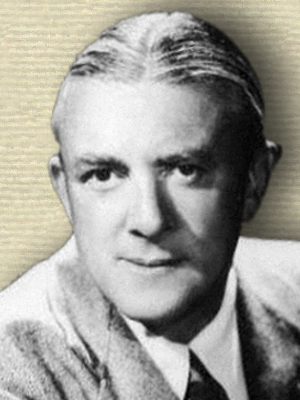
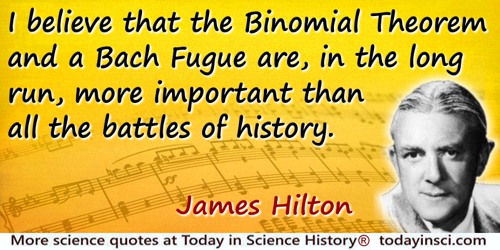
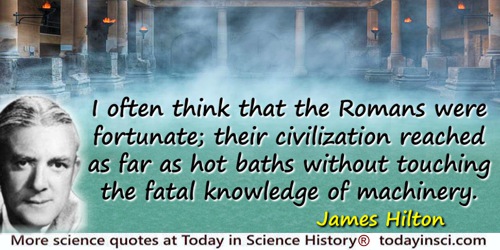
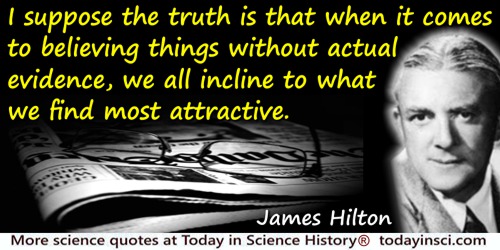
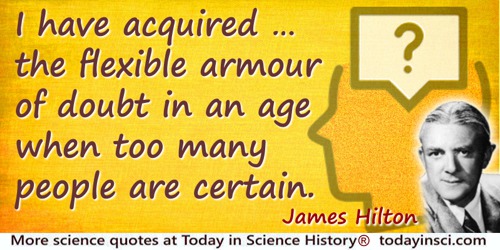
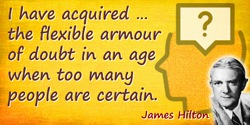
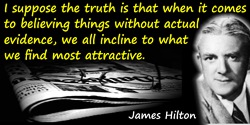
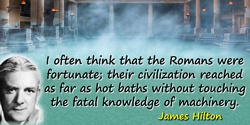
 In science it often happens that scientists say, 'You know that's a really good argument; my position is mistaken,' and then they would actually change their minds and you never hear that old view from them again. They really do it. It doesn't happen as often as it should, because scientists are human and change is sometimes painful. But it happens every day. I cannot recall the last time something like that happened in politics or religion.
(1987) --
In science it often happens that scientists say, 'You know that's a really good argument; my position is mistaken,' and then they would actually change their minds and you never hear that old view from them again. They really do it. It doesn't happen as often as it should, because scientists are human and change is sometimes painful. But it happens every day. I cannot recall the last time something like that happened in politics or religion.
(1987) -- 


